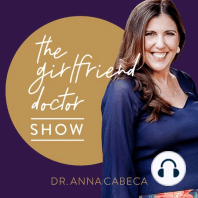58 min listen

From Saving Ecosystems to Saving Immune & Hormonal Systems with Reed Davis
From Saving Ecosystems to Saving Immune & Hormonal Systems with Reed Davis
ratings:
Length:
47 minutes
Released:
May 17, 2022
Format:
Podcast episode
Description
On this week’s episode of the Girlfriend Doctor Show, we had a delightful conversation with Reed Davis. After helping thousands of plants as an Environmental Paralegal, and then thousands of people as a Certified Nutritional Therapist and Health Coach, he observed what works and what doesn’t when it comes to underlying health issues. He integrated his professions to become president of Functional Diagnostic Nutrition, where he specializes in rebuilding and maintaining the stability of the hormone, immune, digestion, and detoxification systems. In this episode, we also discuss the dangers of thyroids, as well as exterior factors that may exacerbate our brain and gut health, such as toxins in the air and artificial colors, flavors, and preservatives. Almost every guest we have on here always seems to circle around a topic that we discuss quite frequently on The Girlfriend Doctor, and that is the idea that we are what we consume. We have to monitor our nutrition on a daily basis in order to reverse or prevent chronic disorders and illnesses, not only for ourselves but for our children as well. Tune in and find out exactly how Reed got his start in the world of functional nutrition and how people being healed, heals him! KEY TAKEAWAYS (with timestamps): [0:22] What brought Reed to the world of functional nutrition [4:54] Thyroid is an adaptive measure [6:41] Diagnostic testing to figure out issues with thyroid health [12:02] Different testing methods for hormone health [17:18] Strategies to improve thyroid function [21:58] Some common toxins that affect our health [28:35] Endocrine disruptors and other exterior factors that lead to chronic illness and disease [43:14] Rundown of the main ideas of the episode WHERE TO FIND THE GUEST: https://www.functionaldiagnosticnutrition.com/ MEMORABLE QUOTES: “One of the things behind thyroid is to understand that it’s actually an adaptive measure. If you’re under a lot of stress, what would the body want to do? It would kind of want to hibernate.” “The thyroid is just getting signals like all your organs. They get signals through the blood and through hormones that travel through the blood.” “What we definitely see are the self-improvements. By giving people the diet, the rest, the exercise, the stress reduction is so huge… Your cortisol and DHA get balanced and your sex hormones seem to smooth out a little bit.” “When someone has thyroid dysfunction, on the hypo-thyroid side, it can be just an adaptive response to the levels of stress you’re at.” “We ran a couple of tests and found the boy was eating foods that were very irritating, neurostimulators and things like that.” “Talking about the six main categories behind imbalances, so hormones, immune system, digestion, detoxification, energy production, and nervous system.” “Healthy mind, healthy body, and nutrition… nutrients that we need. And that goes down to the gut, the microbiome.” To Learn more about my services, products and to stay connected, visit me at: The Girlfriend Doctor Website Book: MenuPause: Five Unique Eating Plan to Break Through Your Weight Loss Plateau and Improve Mood, Sleep and Hot Flashes https://www.instagram.com/thegirlfrienddoctor/
Released:
May 17, 2022
Format:
Podcast episode
Titles in the series (100)
Pelvic Floor Strength & Support – Making It Fun & Revitalizing: Michelle Kenway is an Australian postgraduate qualified Pelvic Floor Physiotherapist and author of the internationally acclaimed women’s exercise program, Inside Out. Michelle has produced a number of instructional exercise DVDs for women teaching the by The Girlfriend Doctor w/ Dr. Anna Cabeca